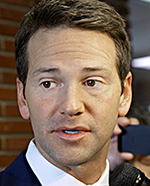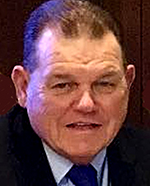
Aaron Schock

Darin LaHood
Filed in October 2015, the suit claimed that a mass-mailing letter signed by then-Congressman Schock and then-state Sen. LaHood and sent to area homes days before the 2014 election was defamatory and hurt Burns’ reputation and business by accusing him of misconduct.
The Peoria County GOP committee was named as a defendant because it paid for the letter.

Dick Burns
Burns’ attorney, Peoria lawyer Christopher Ryan, said the statements make “factual allegations which are false in their entirety. [They] cannot be characterized as opinions, hyperbole, or loose or figurative language, cannot reasonably be subjected to an innocent construction [and] they imply not only the potential of criminal conduct but also impropriety in Mr. Burns’ professional integrity in agriculture as well as in his professional reputation as a judge for cattle shows.”
Specifically, Burns, a long-time cattle judge, has never shown hogs, never cheated at the State Fair, which does not offer cash prizes, and is not banned. The rumor was never substantiated through contact with the State Fair.
The Community Word examined hundreds of pages of deposition, where people involved testified under oath. Their responses reveal some of the inner workings of local politics and the extent to which accusations and innuendoes might be acceptable, even effective.
According to sworn depositions, the claim stemmed from gossip conflated from one article in a Quincy newspaper and blogs in the 2008 Congressional campaign between Schock and Colleen Callahan, who is married to Burns. That story was about Callahan opponents tying her to a 1998 4-H hog competition where their daughter’s hog was disqualified, and where the hog was found ineligible but was destroyed before a veterinarian could examine the animal, leading to a fair employee being terminated. (It doesn’t mention Burns himself.)
Asked in 2018 where political consultant and one-time Vice Chair of the Peoria Republican committee Steve Shearer got the information for the letter — that in 2019 he said under oath that he conceived of and wrote — political consultant Karen Disharoon, who’s worked with Shearer, said, “I believe there was a newspaper article [and] he had documentation on his computer and that that computer had crashed.”
That same year, Katherine Coyle, the committee’s chair in 2014, said she was never shown the letter beforehand, never saw a draft, and never reviewed or authorized it, and when she saw it afterward considered it “very negative.
“I didn’t know if this was true or not,” she added, commenting, “I didn’t really care for the tone.”
Still, it may have been effective. The local GOP paid for 3,000 copies and Burns lost the race by 484 votes, election records show. Further, the people LaHood said he asked about its accuracy were all Republican elected officials, supporters or consultants, and though they confirmed rumors existing, none subsequently testified they had personal knowledge about the allegations.
Over the years, the case was delayed by tardy responses, changes in attorneys and difficulties reaching Schock. However, a tentative settlement was “98% resolved” in 2020. But months later it collapsed since defendants couldn’t agree on a retraction’s wording and who would pay what percentage of a cash settlement offer, according to Burns’ attorney Ryan.
Legal Background
The defense cited 1964’s landmark New York Times v. Sullivan case, and some of those involved implied hearsay may be substituted for facts.
Former Republican state senator and city councilman Chuck Weaver — who with Peoria County Board member Brian Elsasser believed the claim was true, according to Disharoon’s testimony — in sworn comments last year said he didn’t confirm the story and didn’t see it beforehand. Weaver said, “There was a lot of talk. I do not have personal knowledge. I have an understanding of what other people have said.”
He added that he doubted some of the claims. “I don’t believe [anyone in the Burns family] were banned,” he said.
Apparently frustrated with the idea that people were just repeating what they’d heard, Burns attorney Ryan in an exchange during Weaver’s deposition, said, “I’ve heard space lasers caused California fires, but that doesn’t mean it’s true.”
As far as Sullivan, it established that for plaintiffs running for public office to prevail, they must not only prove the publication of a false defamatory statement but also must prove the statement was made with “actual malice.”
Steven Heyman, a First Amendment scholar, author and professor of law at Chicago-Kent College of Law School, told The Community Word, “In libel, ‘malice’ doesn’t mean hostility or ill will. It means using something that’s knowingly false or something that a reasonable person would doubt under such circumstances.”
Defendants must show they had no reasons to doubt the truthfulness of the claim or the accuracy of the reports, and that there was no “reckless disregard for its falsity.”
Good faith?
LaHood’s lawyers in a Sept. 29 motion wrote, “LaHood investigated the matter and came to a good-faith belief that the statement in the letter was in fact true.”
Although Judge Risinger is a Republican (even declaring in court on February 25, 2021, that “I am friends with Darin LaHood”), he assured the parties that his decision was not political.
“I can absolutely care less about politics and political party,” he said. “I don’t care about substantial truth. Actual malice is where I’m at.”
Before granting summary judgment in favor of all defendants, Risinger said, “LaHood and Schock, they relied on people that they knew had been political associates. Failure to investigate does not in and of itself equal malice. It’s a really good idea to do an investigation, but is it required? The way I read the law right now, no. It’s not required.”
In fact, after years of courts generally using either the extent of defendants’ investigations or the source of the information to determine reckless disregard, a case Heyman mentioned, St. Amant v. Thompson (1968), said evidence must show defendants published with serious doubts as to the truth of the statements.
The defendants at various times said they’d relied on input from people including Shearer, Elsasser, a Missouri cousin of Schock’s, and a few unnamed farmers — again, all Republicans, backers, or operatives.
LaHood in 2018 said, “I didn’t have specific information or details … I didn’t have any independent knowledge of that. I go on my reliance of Steve Shearer and Brian Elsasser.”
Schock — who said he never read the letter before approving his electronic signature and had no personal knowledge of the accusations “beyond the hearsay that people have told me” — in 2017 testified he’d been told the claim was true by people such as GOP supporter Margie Cullinan.
Asked about her providing information, Cullinan this February replied, “No, because I didn’t know anything about this.”
Shearer in 2019 said he’d talked to “four individuals with knowledge about this,” including Elsasser (who repeatedly testified he had “no personal knowledge” of the assertions), Schock’s realtive, and unnamed farmers. None provided written information, Shearer said.
Knowledgeable?
The sources cited all conceded they didn’t have first-hand knowledge of the letter’s assertions.
Elsasser, who replied he didn’t remember things about 50 times during his sworn testimony, said he’d recalled thinking the letter was unnecessary: “[The late County Board member Carol Trumpe] and I both said, we can win the election without this. We both should have … shown more conviction.”
Indeed, in his 2021 deposition, Burns’ lawyer Christopher Ryan questioned him:
Q: Do you remember Darin LaHood asking the people in the room, “Can you prove what that sentence says?”
A: I don’t recall that question right offhand. He may have.
Q: If he had asked that question in your presence, how would you respond?
A: I would say if you’re going to go back and prove something, you would have to call the Illinois Department of Agriculture” [a division of which is the State Fair].
At press time, Burns’ lawyer Ryan said, “We will be appealing the order, in part. We did not agree with the Court findings on Malice, particularly as to Schock and Shearer (who was acting as VP of the Peoria County Republicans).”
It’s unclear if the Republicans involved remain close. Asked if she’s spoken to Shearer recently, Coyle said, “We do not speak.” Also referring to Shearer, LaHood in his deposition said, “I have had very few conversations with him.”
Still, Risinger’s ruling may reinforce Shearer’s opinion, based on Harding’s 2018 recollection of Shearer’s statement to him. Under oath, Harding recalled Shearer “shared with me his interpretation of the law that applies to political and campaign mailers … that the threshold for accuracy … in his opinion is different than what we would expect in everyday life, and that in political mailings unfortunately sometimes candidates say wildly inaccurate things and potentially get away with it.”
Schock testified, “I think voters view political mail … in the same way they view a TV ad or a candidate’s speech.”
Meanwhile, Burns testified that he’s lost tens of thousands of dollars in business, and more than one former customer said, “If a Congressman and Senator sign something, it has to be true.”
Maybe not.
Who’s who in the libel suit
A look at the particulars in the lawsuit filed by Dick Burns against current and former Congressmen Darin LaHood and Aaron Schock and the Peoria County Republican Central Committee for sending a campaign letter that stated, “Dick Burns has been banned by the Illinois State Fair from showing hogs because he has been caught seriously cheating to win contests with large prizes.”
Dick Burns
Farms or rents about 600 acres. A breeder and shower of Angus cattle, he’s also been a regional manager for Burris Seeds. Married to one-time Democratic candidate for Congress Colleen Callahan, Burns never ran for political office until seeking a County Board seat in 2014.
Darin LaHood
U.S. Congressman from the 18th District. Prior to that position, the Republican attorney was an Illinois state senator from 2011-2015.
Aaron Schock
Former U.S. Congressman from the 18th District from 2009-2015. A Republican, he previously was an Illinois state representative from 2005-2009 and served on the Peoria Board of Education from 2001-2005.
Steven Shearer
Long-time figure in GOP circles, from working for U.S. Sen. Chuck Percy for seven years to interning with U.S. Rep. Bob Michel. He’s managed or assisted various campaigns, including Jerry Weller and Schock. After Schock’s 2008 election, Shearer became Schock’s Chief of Staff. He’s served as Vice Chair of the Peoria County Republican Central Committee.
Brian Elsasser
Farms outside Princeville, where he raises corn and soybeans. A Republican, he’s represented District 14 on the Peoria County Board for 22 years.
Chuck Weaver
Attorney, businessman and Republican politician elected for the at-large seat on the Peoria City Council in 2011, and appointed to the state Senate for the 37th District in 2015, serving until 2021.
Karen Disharoon
Has worked with Shearer in her career as a political and fundraising consultant, which includes working for campaigns for Republicans Weaver, LaHood and Jim Montelongo. She’s also been a precinct committeewoman for the GOP.
Katherine Coyle
Has been chair of the Peoria County Republican Committee, worked for LaHood and taught in the political science department at Bradley University.
Brad Harding
Served on the Peoria County Board from 2008 to 2018. He’s farmed in the Trivoli area and worked as a local farm broadcaster.
Marguerite Farnham Cullinan
With her husband Mike (who has ownership of River City Construction and heads United Contractors Midwest), is a member of the Republican Governors Association, supported Schock and has done fundraisers for Republicans including Weaver.

Recent Comments